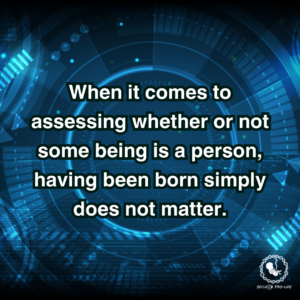Alabama’s IVF Ruling: Embryos Are Children
Today’s guest post is written by Nick Colgrove, who has a PhD in philosophy and has published about ectogenesis (artificial wombs) and personhood. SPL has summarized his work previously.
Imagine that one day, we develop artificial-gestation technologies (AGTs) that allows human beings to develop from conception until nine months in age. Rather than being gestated and born, these human beings would be “grown” and (to use term from the Matrix) “harvested.” Gestation, after all, refers to the “the period in animals bearing live young … from the fertilization of the egg to birth of the young” or “the carrying of young in the uterus.” Birth, in turn, is typically defined as
… the complete expulsion or extraction from its mother of a product of conception, irrespective of the duration of the pregnancy, which, after such separation, breathes or shows any other evidence of life—for example, beating of the heart, pulsation of the umbilical cord or definite movement of voluntary muscles—whether or not the umbilical cord has been cut or the placenta is attached.
World Health Organization
As such, by definition, human beings grown in AGTs (from conception until 9 months in age) are neither gestated nor born. We can quibble over whether the definition of “gestation” and “birth” should be changed, of course, but the terms—as typically defined today—do not apply to humans grown in AGTs.
With this in mind, suppose that you discover you had spent the first nine months of your life within an AGT. This means that you were never gestated and were never born. Yet, you remain, unquestionably, a person. If correct, then being born is not a necessary condition for being a person. AGTs—even if only via thought experiment—prove as much.
This is the argument that I presented in the Journal of Medical Ethics. There, I claimed that the possibility of AGTs reveals that “a human individual need not be born to be deserving of whatever moral status is assigned to born individuals.”
The same thought experiment appeared this week in a ruling by Alabama’s Supreme Court, where the court found that the “Wrongful Death of a Minor Act applies to all unborn children”—including preimplanted embryos—“regardless of their location.” In that case, defendants argued that “an unborn child ceases to qualify as a ‘child’ or ‘person’ if that child is not contained within a biological womb.” Plaintiffs, in response, argued that
… one latent implication of the defendants’ position – though not one that the defendants seem to have anticipated – is that, under the defendants’ test, even a full-term infant or toddler conceived through IVF and gestated to term in an in vitro environment would not qualify as a “child” or “person,” because such a child would both be (1) “unborn” (having never been delivered from a biological womb) and (2) not “in utero.”
LePage v. Mobile Infirmary Clinic
Thus, for any human being grown (from conception onward) via an AGT, the defendants’ view would deprive these individuals of their fundamental rights and protections under the 14th Amendment. This, the plaintiffs argued, would be unconstitutional, since we cannot withhold “legal protection from people based on immutable features of their birth or ancestry.” When it comes to assessing whether or not some being is a person, having been born simply does not matter. Conceptually speaking, personhood must track something else (whether species membership, the capacity for consciousness, etc.).

Ultimately, the court sided with the plaintiffs, given that Alabama’s “Wrongful Death of a Minor Act” allows parents to seek “punitive damages ‘[w]hen the death of a minor child is caused by the wrongful act, omission, or negligence of any person.’” “Child,” the court found, refers to “the immediate progeny of parents,” whether born or not.
This effectively bypasses the question of personhood. Embryos were unequivocally found to be children under Alabama’s law, but that does not mean they are persons.
Does this mean our thought experiment about AGTs is irrelevant? Not really. If the plaintiffs are correct, then adult humans who were grown via AGTs are still persons (despite never having been born). If the defendants are right, then these same individuals will have no constitutional rights. It is not difficult to see the absurdity of the defendants’ claims here. So, while the thought experiment (and court ruling) cannot tell us what personhood requires, the discussion it contains helps us to scratch one option off the list: birth is not necessary.



